It’s been a long time since I reviewed a film by one of my favourite directors, so I decided this one merited a rewatch. Like The 39 Steps and Young and Innocent, The Lady Vanishes is one of Alfred Hitchcock’s early British suspense films. I saw it first when I was about 12 years old; but in the years since, I’ve never forgotten the story – I still remember almost every twist and turn of this film. And I still think that it’s one of the best train journey films ever made.
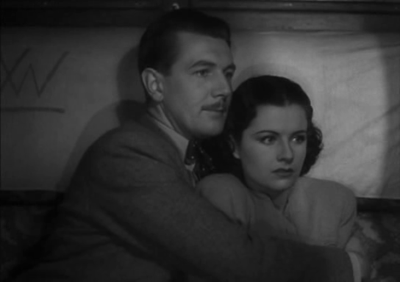
Not that it begins in a train. The story opens in the snowy, mountainous landscape of a fictitious Western European country named Bandrika.
Here, a small hotel has suddenly found itself inundated by tourists, most of whom have had their travel schedules disrupted due to an avalanche. The hotel’s so small, its manager Boris (Emile Boreo), is having a hard time dealing with all the requests for rooms.
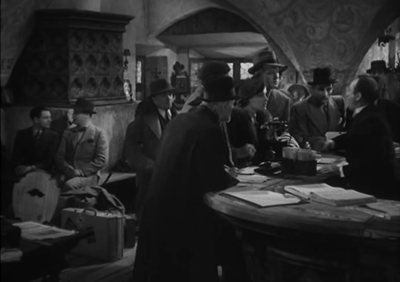
Among the people clamouring for space – and barely getting it – are Mr and ‘Mrs’ Todhunter (Cecil Parker and Linden Travers). From their tense, tight-lipped conversation, it soon becomes clear that the lady is not actually Eric Todhunter’s wife. Instead, both of them have left their respective spouses and are in the process of initiating divorces so that they can get married.

Another twosome that needs a room consists of a pair of cricket-crazy Englishmen, Caldicott (Naunton Wayne) and Charters (Basil Radford). These two are frantic to get back to England because the Manchester test match is in progress, and if they’re delayed any longer, they’ll miss whatever’s left of the match.
Caldicott and Charters are among the unlucky ones who aren’t able to get a room; all Boris can scrounge for them is the maid’s room; the maid herself will shift out.
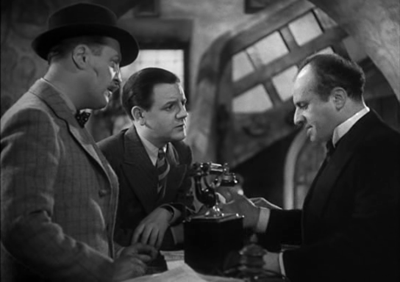
…but she keeps popping in whenever she needs to change her clothes or put on a hat.

There are the luckier ones, though. Most privileged of the lot is a wealthy English girl named Iris Henderson (Margaret Lockwood). Iris, along with two friends, has been hiking about the countryside. The three girls have their rooms at the hotel, and are on a first-name basis with Boris and the rest of the staff.
Iris will be catching a train the next morning, headed back home to London to be married.

Over the course of the evening, we are also introduced to a motherly, chatty and somewhat Miss Marpleish character named Miss Froy (Dame May Whitty). Miss Froy tells a disgruntled Caldicott and Charters – with whom she shares a table in the very crowded dining room – that she is a governess and music teacher, now on her way back to England.

While they’re still at the table, a folk singer outside the hotel begins singing a ballad. Miss Froy, who’s finished her dinner, says goodnight to Caldicott and Charters (in any case, they’re preoccupied with worrying about making it to Manchester). She goes up to her room, opens the window, and immerses herself in the song of the folk singer below her window…

…when a boisterous burst of loud, foot-stomping music from upstairs drowns everything out. Miss Froy goes out into the corridor, where she runs into her next-door neighbour, who happens to be Iris. Miss Froy is merely a little upset; Iris is boiling mad. She immediately goes back into her room and phones Boris to shut up whoever is making the din.
The room is occupied by an Englishman named Gilbert (Michael Redgrave, in his debut role). Gilbert is writing a book on disappearing folk music, and is engaged in some research:

Boris tries to plead with Gilbert, but is smartly sent back. Boris, when he reports back to Iris and admits his inability to evict Gilbert, finds her offering a bribe – which he happily accepts.
A few minutes later, a hot-headed Gilbert strides into Iris’s room with bag and baggage, intent on staying here, since he’s been thrown out of his own room.

Iris has to capitulate, and Gilbert is reinstalled in the attic. The folk singer below Miss Froy’s finishes his serenade. Miss Froy, who has been listening appreciatively and intently, throws him a coin before she shuts the window and draws the curtains.
… and a pair of hands reaches out and strangles the singer.

Next morning, the train is ready to leave. Besides Iris, there are a bunch of other familiar faces on board: Caldicott and Charters, Todhunter and his mistress, and Gilbert.
Iris’s friends have come to see her off. The three girls are chatting when Miss Froy comes by, and in the course of some woolly-headed chatter about a lost bag, drops her spectacles. Iris goes to return them to Miss Froy – who’s bending over the pile of luggage outside the station window – when a pair of unseen hands pushes a large flowerpot off the upper window.
The flowerpot hits Iris on the nape, just as the train signals its imminent departure.

Miss Froy immediately takes Iris under her wing, reassuring Iris’s friends that she’ll look after the girl. She gets Iris onto the train, just before Iris blacks out.
When Iris comes to, she’s in a train compartment. The kindly Miss Froy is beaming at her from the seat opposite. There are four other people in the compartment: an Italian magician named Signor Doppo (Phillip Leaver) with his wife and four-year old son; and an imperious baroness (Mary Clare).
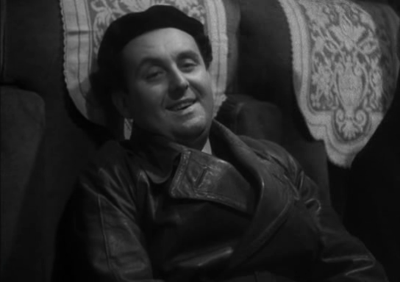
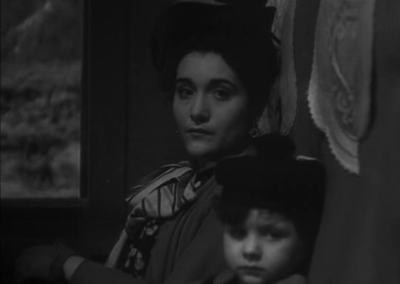
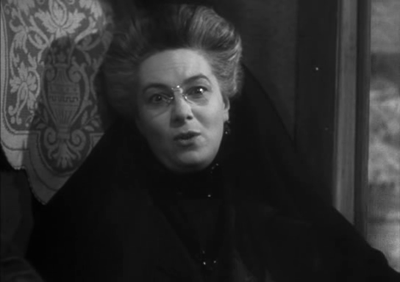
Miss Froy suggests a cup of ‘good, strong tea’ to help make Iris feel better, and Iris agrees. They go to the dining car – Miss Froy inadvertently stumbles into Mr Todhunter’s compartment on the way.
When they’re seated at a table, Miss Froy places the order. She also gives the waiter her own packet of tea – it’s a special herbal tea, the only tea she ever drinks, as she informs Iris. “A million Mexicans drink it,” Miss Froy chirrups, quoting the advertisement of the tea.

The two women chat as they have their tea. Iris introduces herself; so does Miss Froy – or, she starts to. Just as she’s saying her name, the train’s whistle blows, loud and long, drowning out Miss Froy’s voice. So Miss Froy uses her fingertip to scrawl her name – FROY – on the steamed-up window pane next to them.

They also encounter Caldicott and Charters. Miss Froy discovers that the waiter’s forgotten to provide sugar with their tea tray, so she requests the two Englishmen for the sugar bowl at their table. They (and this is no surprise to anyone) have emptied the sugar cubes onto the table – Charters has been describing the field placement of a certain cricket match to Caldicott. They’re not at all happy to have to put the sugar cubes back into the bowl and hand it over to Miss Froy and Iris.
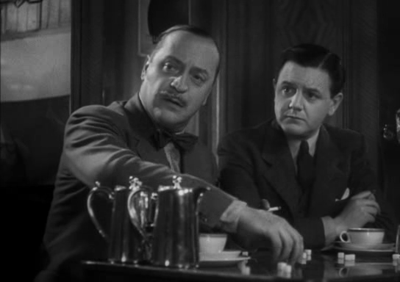
Eventually, though, tea is over. Iris and Miss Froy return to their compartment. Miss Froy encourages Iris to sleep a bit; she’ll feel better. Iris complies.
And when she wakes, she is feeling better – and the seat opposite her is empty. Where is Miss Froy?
When Iris asks the other people in the compartment, they deny even the existence of Miss Froy. Signor Doppo and his wife look puzzled; the baroness looks down her nose as if questioning Iris’s sanity.

Iris goes out of the compartment and begins looking for her friend. In the dining car, the waiter who served them insists that Iris was on her own. He even offers to show her the bill: tea for one person.

Now thoroughly distressed and certain something awful has happened, Iris goes rushing through the train, looking for Miss Froy.
Instead, she bumps into Gilbert. He’s inclined to be sarcastic and to resume their quarrel from the previous night. But Iris’s obvious anxiety makes him finally agree to help search for Miss Froy, if only to humour Iris – Gilbert firmly believes that this Miss Froy is a figment of Iris’s imagination.

… a theory confirmed by a brain surgeon, Dr Hartz (Paul Lukas) whom they meet on the train. Dr Hartz is understanding and supportive, assuring Iris that the concussion she suffered because of the falling flowerpot could easily lead to this.
Dr Hartz mentions (with somewhat bloodcurdling excitement) that a new patient of his – the victim of a terrible accident, suffering from severe concussion – will be put aboard the train at the next stop, the first time the train’s going to halt since its journey began.

Gilbert and Iris resume their questioning of people.
Mr Todhunter, when confronted, says he doesn’t remember anyone answering to Iris’s description of Miss Froy. [A conversation between him and his mistress, just before, reveals that Todhunter hopes to be appointed a judge once he’s back in England. He’s scared that even a hint of a scandal – like his infidelity – will spoil his career].

A similarly selfish reason makes Caldicott and Charters deny Miss Froy too. Charters has overheard a panicky Iris saying that she’ll have the train stopped unless Miss Froy is found. The train can’t afford to be stopped; they’ll miss their connection, and they’ll never make it in time for the last day’s play at Manchester… so when Iris confronts them about Miss Froy borrowing the sugar bowl, they deny it.
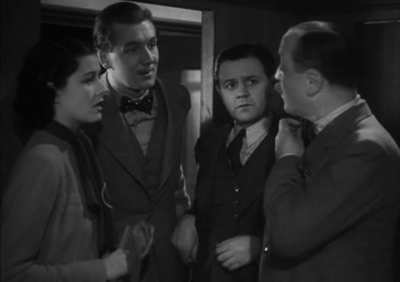
Todhunter, Caldicott and Charters have their own warped reasons for not admitting the truth – but what about everybody else? Why is everybody saying there is no such person as Miss Froy? And where on earth has Miss Froy disappeared? The train hasn’t stopped even once since it started; but Miss Froy is nowhere to be found.
Where has the lady vanished? And why?
The way it builds up. The first 20 minutes or so of The Lady Vanishes are slow and innocuous: the excitement of Iris and her three friends; Caldicott’s and Charters’s single-minded obsession with cricket; Miss Froy’s sweet, slightly fluffy-minded meanderings; and Gilbert’s run-in with Iris. All seemingly the makings of a run-of-the mill romantic comedy. But it’s not, really, if later in the film you start looking back at those first 20 minutes. They establish the characters, and if you pay attention, you’ll see the bases of people’s motives building up right here – and you’ll come across a few interesting details that affect the story later on in the film.
I also love the very ‘stiff upper lip’ English sense of humour that sparkles through in places – especially when it comes to the conversations between Caldicott and Charters (who do take themselves very seriously!). Gilbert and Iris are witty, too, when they’re at daggers drawn.
What I didn’t like:
I’m passing this up. Nothing.
Little bit of trivia:
Interestingly, three elements of The Lady Vanishes came together in another suspense-thriller film, made just two years later: Night Train to Munich (1940). Margaret Lockwood was the heroine in that film too (opposite Rex Harrison). Like The Lady Vanishes, it is partially set on a train – though The Lady Vanishes is more of a train movie than Night Train to Munich, despite the name of the latter. And, in Night Train to Munich too Basil Radford and Naunton Wayne reprised their roles of Charters and Caldicott.
Personally, though, I think Night Train to Munich is very forgettable in comparison to The Lady Vanishes. Hitchcock is Hitchcock: in a class by himself.
Note: You can watch The Lady Vanishes legally online, through this link (on IMDB) to the Internet Archive:


I’ve seen this. Yayyyyy :)
LikeLike
And? What did you think of it? The ‘Yayyyy’ seems to suggest you liked it. ;-)
LikeLike
love it as most hitchcock films…
LikeLike
Same here. His films are never bad, in my opinion.
LikeLike
Sharmi, You and dustedoff both are such good reservoir of movies na, I can read, read, and enjoy whole day.
Dustedoff, Read your comment on Piyush’s blog on Satyakaam, Please accept your professor suggestion, and do a post on Satyakaam too, I know its a bit extreme take on TRUTH, but atleast for sake of performances. Dharmendra’s best effort till date.
Nice analysis thou ! Btw, Sharmi I’m not able to comment on your blogs..
LikeLike
Thanks, Gaurav – glad you liked this review.
As regards the Satyakam review – well, I don’t know. I certainly agree that Dharmendra’s acting is superb in that (I recall reading somewhere that in an interview much later, he said that when he failed to get a Filmfare award for either Anupama or Satyakam, he gave up trying to really act). I can’t bring myself to rewatch Satyakam (partly because of my professor, partly because I find the film very depressing), but I just might rewatch Anupama one of these days. I love that movie.
LikeLike
Could not agree with you more on this movie, a must see for all Hitchcock fans, and a great example of how to make movies. This one still has more going for it than most of the recent ones, even with much less technology.
A real thumbs up for good storytelling vs just computer generated stuff.
LikeLike
I am actually surprised by the number of people, even self-professed Hitchcock fans, who only know him for his Hollywood movies – the Rear Window, Psycho, Birds, Vertigo and North by North-West type. Those are fantastic, of course, but (as you point out) this one’s a must-see as well.
Oh, and I completely agree about good storytelling vs computer generated stuff. I went along (unwillingly) with my husband to watch the second Sherlock Holmes movie a couple of weeks back, and ended up hating most of it. Yes, very sleek and all that, but except for those brief moments of swift image-changing that shows how Holmes is piecing together a puzzle… it’s really not a mystery story at all.
LikeLike
I haven’t seen this film!
and your description of the plot and the building of the climax has already given me the goose-bumps
and it is so late here and I have to go to sleep and so much work tomorrow and day after!
*Argh*
O when will I be able to watch this? :-(
Madhu, Madhu, Madhu you will be my downfall… someday! ;-)
LikeLike
Oh, you must see this one, harvey – it’s a real gem of a film! And you like Hitchcock, don’t you? (I remember reading that fine review you did of Rope)
Never mind, though – since it’s on the Internet Archive, I doubt that it’s going anywhere. Bookmark that link, and watch it whenever you get the chance. I do that. (The only problem is, now my list of bookmarks has gotten unmanageably long). :-(
LikeLike
I love Htichcock films, you know that!
LikeLike
End Feb, three films of his are on the books: Spellbound, Shadow of a Doubt and Saboteur! Looking forward to it!
LikeLike
Lovely! I hope you enjoy them. :-) I like all three films, though Spellbound is probably my favourite of the three, simply because it features two of my favourite actors – Ingrid Bergman and Gregory Peck. The plot’s good too. Shadow of a Doubt is gripping; really excellent. Saboteur reminded me a bit of The 39 Steps in some ways, or Young and Innocent: a man is incriminated in a crime he did not commit; he goes on the run, trying to find the actual culprit… good.
LikeLike
Hitchcock is always interesting to watch. Even the not so-good films. ‘The Lady Vanishes’ sounds really intriguing, I must see it.
LikeLike
I don’t think I’ve ever come across a Hitchcock film which was bad. Some are better than others, some are masterpieces, but none are bad. This one’s a very good one.
LikeLike
I like his British movies better too – I think Hollywood diluted even poor old Hitch. This one was a winner, and now you’ve made me want to re-watch it too. Especially since you put that link there – so tantalising! Madhu, Madhu, Madhu, you’re already the cause of my downfall! Where am I going to find the time to re-watch all these movies, especially when I have shelves of unwatched films??
LikeLike
:-D
If I can’t be a good writer, at least I can be the downfall of some fellow-bloggers! ;-) (That would be a way to cut out the film-blogging competition, no? Get everybody so busy watching films, nobody has the time to blog any more… but where would be the fun in that? Half the joy of blogging lies in seeing what new posts your friends have published).
BTW, have you seen Frenzy and Family Plot? Also Hitchcock, late British – 70s – and good in their own way.
LikeLike
This one is indeed a classic Hitchcock. The movie becomes watchable every few years, that is the beauty of the way Hitchcock has built it.
@Dustedoff- Congratulations for such a lucid presentation of the movie.
This will certainly induce quite a few to watch not only The Lady Vanishes , but also Train to Munich.
LikeLike
You put it very well by saying that “The movie becomes watchable every few years“. A lot of suspense films, unfortunately have the suspense built up in such a way that once you’ve seen the film and know the end, you can’t really enjoy it in subsequent viewings (That happens to me with Jewel Thief). But The Lady Vanishes is certainly classic Hitchcock – even though I know what’s happening and who’s behind it all and why, I enjoy it just as much.
BTW, avoid Night Train to Munich – it’s not Hitchcock, and really not that great.
LikeLike
I did watch it last night!
It started off very promisingly. When I watched the film, I could appreciate more than ever, your wonderful description of the scenes. You have captured the atmosphere and milieu of the situations so aptly in your words! Simply great!
Since I myself have a neighbour upstairs who turns on her washing machine in the middle of the night, I couldn’t really warm up to Gilbert though.
Spoilers ahead
As soon as the German surgeon (his nationality is not revealed but one knows from his accent) appears, I knew what was afoot. And from then on it just started slithering downhill for me. It turned out to be very predictable with all the necessary cliched elements of slimy Italians, Baroness with unpronunciable name, the train personnel speaking gibberish Balkan dialect, the vamp with a pattriotic heart. The only thing missing was a army general wearing a monocle.
But it is all very understandable in that, that it was 1938. Europe was preparing itself for war. In 1937-38 GB was sure it will be soon waging a war with Germany and Italy. It might have not known how Austria would sway. There was the civil war few years back in Austria, the fascist government was swaying. That is why I think, that Hitchcock was aiming at Austria, when he refers to Bandrika.
Further sign of war propaganda film is the portrayal of the pacifist. He is a slimy, two-timing, adulterous lawyer.
The escape with the train was for my eyes funny, the military could have easily entered the compartment, since the engine has just started but the don’t make any attmepts for that. Or they could have jsut thrown a bomb, which would ahve finished them and blame it on some sort of insurgents, which such totalitarian governments always do.
Spoilers end
The message which comes across is British (except for the pacifist-cum-adulterers) are good all others bad. :-)
This one had for sure the curse of the second half.
Hitchcock would go on to make another war propaganda film, which is nearly unknown, Bon Voyage [1944]. http://www.imdb.com/title/tt0036659/ I saw it at the local film festival diagonale. Splendid! It also has its share of cliched roles, but one has to expect such things in a war against the devil incarnate Nazis!
LikeLike
Some spoilers ahead:
True, there are a lot of stereotypes here, harvey. (Incidentally, my initial reaction to Bandrika was “Is this supposed to be Switzerland?” Boris’s announcements to the people in the lobby are in German and French, if I remember correctly, and there’s a lot of Italian being spoken in it too). But, yes; you’d know better, considering you know Austria and its history far better than I could ever.
“The escape with the train was for my eyes funny…”
Oh, come on! Give them a break! Have you ever seen onscreen villains having that much sense? ;-)
Spoilers end
I agree there’s war (or pre-war) propaganda at work. Not particularly surprising, really. After all, during the war, many actors (I’m especially talking Hollywood) ended up being lambasted because they didn’t join the war effort and go into battle. War films were being churned out left, right and centre (even if they didn’t have anything directly to do with war), and propaganda seemed to be the in thing. BTW, if you haven’t seen it already, please do avoid the Robert Taylor-starrer Bataan. You don’t get more in-your-face propaganda than that!
I’d heard of Bon Voyage, but haven’t watched it yet. Will certainly look out for it now. Thank you!
LikeLike
No it wasn’t the war propaganda that disturbed me, it was much more the let down that came after building up such a wonderful suspense. The curse of second half afflicts Hitchcock quite often. The one example which springs in my mind is The Birds.
Of course I am very sensitive to cliched potrayals of nationalities or communities, but I tolerate them at times like in Padosan.
Moreover I think, I expect more from Hitchcock. I was infact waiting when the vamp would get killed. I was thinking she would die on the rails while she changed the tracks for the train.
On the other hand I am grateful towards the propaganda films for helping defeating the Nazis and the Fascists.
All the same it was a nice film in the first half and the gay couple was very amusing.
LikeLike
Spoilers ahead:
You know, I’m not very sure they were gay. In fact, I hadn’t thought about it at all. Do you remember, when Boris says he can give them the maid’s room, they’re cribbing to each other why he couldn’t give them one each… and the other clarifies (while he’s looking at the maid as she bustles about her room): “A room, I mean – not a maid.” Something sort of sly about that. ;-)
And as for them being in a single bed, one wearing the uppers of the pajamas and the other wearing the lowers – they’d accidentally dropped a pair of pajamas in the basin of water in the room – it’s a blink-and-you-miss-it moment, but it does happen.
LikeLike
Funny you should cite exactly that line. I checked it and what you have written is completely right. imdb quates it wrong though. I interpreted it more like the person who says that wants to clarify to his partner that he his not swinging onto the other side.
“accidentally dropped a pair of pajamas”
or intentionally?
My interpretation would be that the Caldicott and Charters angle does have lot of sub text. The consternated lookon their faces when the maid comes to change would be another such example. But there are bound to be other interpretations. Homosexuality was not such an open topic in those times.
I would think that the gay characters werre added intentionally to rally gay men for the service as well.
LikeLike
Okay, I just rewatched that section where the maid comes in to take her hat, and yes – it may be that the pajamas drop into the water intentionally.
I’m still not certain about whether the consternation in their expressions – when Charters is wearing the shirt and Caldicott the trousers of the pajama – is simply because they’re in the same bed, but because she’s found them half-dressed.
I suppose it’s all open to interpretation. But yes, I agree that homosexuality then was a topic nobody talked about. While Hitchcock may have been trying to reach out to gay men and enlist their support, it could well be possible that this was a sly wink (are the two gay? Are they not?) at society’s so-called ‘morals’ in general.
LikeLike
P.S. Yes, I found the ending of Birds rather a let-down too. But as a movie, it’s obviously very effective. The people who live in the house facing ours put out birdseed and water on their balcony, and as a result, at almost any time during the day, at least a dozen birds – mostly crows or pigeons, often just crows – can be seen sitting there. Often they’re sitting on our balcony, some 10-12 crows. I invariably get very nervous when I see them! (And that wasn’t the case before I watched Birds)
LikeLike
On Sunday I was in Vienna at the central cemetry and on the tree near the gate there were many black crows perching. The sky was downcast, a bit foggy. That was eerie!
LikeLike
I always used to associate crows with a canny sort of intelligence (partly because of R K Laxman’s fantastic cartoons of crows – I saw those when I was a kid, and loved them). But yes, ever since I watched Birds, that intelligence has started scaring me a wee bit.
LikeLike
I love links to the films reviewed so one can watch on net. :)
Since I haven’t seen this and didn’t read yur review (want to watch it for myself first) I read only the last bit about what you liked.
Thanks so much DO. I’ve watched qute a few of the mysteries that you’ve reviewed.
LikeLike
I hope you enjoy the film, pacifist! I am very fond of mysteries and suspense movies, and this is one of my old favourites. :-)
LikeLike
I meant, I’ve watched quite a few of the mysteries *after* reading your reviews.
This is one of my favourite genres too :)
LikeLike
I am flattered that you watched them because of my recommendations! I must dig some more of my favourite mysteries. ;-)
LikeLike
Do, do!!! I need to know some more names. :-)
LikeLike
I will. :-)
LikeLike
LOved it…Saw it twice. And Sir Michael Redgrave is sooooooo charming and funny….He was Vanessa Ragrave’s dad and Natasha Richardson’s grandfather, right? Loved him..:D
LikeLike
Yes, he was Vanessa Redgrave’s father. I loved Michael Redgrave too, in The Lady Vanishes – he was annoying to start off with in this film, but one couldn’t help but like him. :-)
Incidentally, another Michael Redgrave film that I’d recommend – very different from this one – is The Captive Heart. Romantic and lovely, even though it’s set in a POW camp during WWII.
LikeLike
THanks for the recommendation. Will try to find it online…:-)
LikeLike
Here it is, on youtube:
LikeLike
One Hitchcock film I enjoyed very much – unexpectedly- was The Trouble with Harry.
LikeLike
I’m very fond of that one too! But then, I am partial to black humour anyway. And The Trouble With Harry is one of the best classic examples I’ve seen of that genre.
LikeLike
Agree absolutely!!
LikeLike
This comment is a reply for whoever posted a question about recommendations of modern films based on classics. I’m sorry, I saw your comment in the blog dashboard, and though I approved it, it seems to have disappeared into the black hole that’s cyberspace.
Could you repost your question, please? I didn’t read it carefully enough the first time – I’d been meaning to come back to it later – and by the time I did return to it, it was gone, so I don’t remember exactly what you wanted. Sorry about that.
LikeLike
I saw this film long ago and then again sometime last year on you tube, needless to say I loved it. But then I love Hitchcock’s films. The way he builds up the story is what keeps me engrossed.
LikeLike
Yes, Hitchcock has this ability to keep the viewer hooked – and everything, even small details, eventually tie up somewhere in the story.
LikeLike